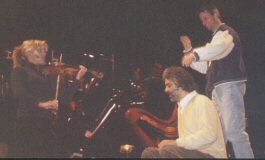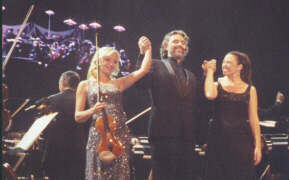|

Philadelphia, December 8, 2002
Until last Sunday in Philadelphia, I thought that the voice on
the Sentimento CD was about as good as it gets and that
last June’s concert in Washington, DC, was an ultimate high.
That was, until this past Sunday in Philly at the First Union
Center when Andrea Bocelli strode strongly with Steven Mercurio
to center stage and, with the solid, sensual tones of
"Aranjuez," took command and never let go.
The orchestrated lights, the perfectly measured sound system,
the dominant backdrop of the single, giant screen revealing the
larger-than-life intimate details of a passionately focused
performance…this was one classy production—grand, but never
overshadowing the force of Andrea’s quietly charged presence.
The man is distilled elegance.
And his companions. Hard to resist the charming image of
Andrea striding proudly onstage with an extraordinarily talented
beauty on each arm! Each so young—and gifted with this
opportunity by a generous-hearted colleague who understands well
its importance. Lidia Baich is a diminutive dynamo, her capable
musicianship charged with energy and finesse. Violin and tenor
voice—liquid silver and molten gold. And darling Maria Luigia
Borsi, just a delight! The sweet and saucy ingenue with a voice
that blends beautifully with Andrea’s in "O soave fanciulla."
She has an easy presence that interacts warmly and gently with
Andrea. Yet, she has the dramatic power to capably convey the
darkly glowing sensual embers banked beneath the love duet from
Otello, "Gia nella notte densa."
Of course, the faithful presence of Maestro Mercurio is by
now almost a given for these concerts—instinctively and
ceaselessly supporting his friend with solid artistry.
Reassuringly gleeful companion. Essence of energy. Inspired
djinn. He takes those familiar and not-so-familiar orchestral
pieces and makes them fresh for us, squeezing every ounce of
dedication from the marvelous musicians who surely are somewhat
weary on this, the last night of a long tour. But there he is,
conjuring life into them and into this music in a manner
somewhat reminiscent of the wildy animated sorcerer’s
apprentice, Mickey Mouse.
There is something extraordinary happening here. This amazing
concert combines an intoxicating mix of sheer operatic power
(the Otello duet and "E lucevan le stelle"),
nostalgically old-fashioned romance (Tosti's "Musica proibita,"
"Because"), smoldering sensuality ("Occhi di fata"), haunting
melodies ("Plaisir d'amour," "Core 'ngrato"), the sacred ("Panis
angelicus"), the profane ("Marechiare"), and classic pop ballads
("My way"). And one voice owns them all.
Almost always at some point in these concerts I glance over
the faces in the audience, noting its make-up. This crowd was, I
think, one of the most diverse I have seen, many of them
young—20s and 30s—many of them couples, many with very small
children. I had to wonder how many might have missed discovering
the power of Verdi or the meltingly lilting beauty of Juliet’s
"Je veux vivre" by Gounod if they hadn’t been led here by the
Tuscan pied piper of "Melodramma," "Con te partiro," and "My
Way." Diverse or not, Andrea brought them all to their feet time
after time with the emotional power of that voice, which at
times seemed almost too much to bear. More than once, after the
thrill of an impossible note, I looked at my friend in
astonishment. And how we take delight in "coaxing" encores from
Andrea. But kids, I think it’s only an illusion. Almost before
we were finished asking, he was up there tossing them out to us
like candy from a Mardi Gras float! I think the man is actually
having a good time, and he is doing things with his voice that I
haven’t yet mastered the vocabulary to describe!

Here’s the thing. Everything seems to be coming together.
Measured in smiles per performance minute, this is one happy
tenor. More relaxed than any of us, maybe even Andrea himself,
would have thought possible, he is clearly in a good place with
his voice, and it shows in his confident air. Almost hard to
believe for those of us who have been watching from the
beginning! But this young tenore of ours is just
approaching the prime of his career—with plenty of room to grow.
Now how does that quote go? "Grow old with me…"
Cami McNamee
On December 8, 2002, I heard
Andrea Bocelli at the First Union Center, in Philadelphia. I'd
thought at one point that I wouldn't go to any more arena
concerts because of the drawbacks of poor acoustics and heavy
amplification (too loud, too distorting) and because of the
burden that concert tours place on Andrea. But when tickets went
on Internet presale for the December 8 concert, there I was
online buying mine. The seats were in the lowest price range,
but in the first row of the mezzanine section and close to
Andrea's side of the stage. The seats were good; Andrea was
stupendous.
When Andrea first performed in Philadelphia-on July 21, 1998-he
was equally wonderful because the emotional warmth of his
singing, his ability to reflect on and convey the meaning of
each song or aria as he is performing it, his sincerity, and his
commitment to music have always been with him and always been
clear. But the growth and development of Andrea as an artist
were striking to witness at Sunday's concert. The shyness and
nervousness so evident in 1998 were replaced by his commanding
presence on stage and the power and individuality with which he
performed every piece. He is in full flower as a singer and as
the wonderful individual he reveals through his singing.
Andrea recently said that "E lucevan le stelle" is his favorite
aria, if he had to choose one. On Sunday, he sang "E lucevan le
stelle" with more emotional intensity and sincerity than I could
have imagined anyone being capable of expressing. That aria was
a highlight in an evening of highlights. "O soave fanciulla"
also moved beyond magnificence to something celestial, and the
shared high C's at the end went on and on.
In "My Way," Andrea seemed to double up his will and his spirit
and drive them through the song. I liked the fact that the
result was not so much a glitzy performance as a manifesto.
Having played Sentimento dozens and dozens and dozens of times
since it was released, I was moved by hearing four of the songs
with Andrea right there in front of me (not too far away,
anyway!), and these live performances ("Aranjuez," "Plaisir
d'amour," "Occhi di fata," and "Musica proibita") were even more
affecting than the recorded versions.
Another special choice was "Panis Angelicus," which Andrea sang
as angelically as I've ever heard him. I did feel he was
actually saying some sort of prayer before he started singing,
rather than just giving the impression of prayerfulness by
folding his hands on his chest.
And then there was "Core 'ngrato." Whether or not Andrea's
Neapolitan accent is up to snuff is entirely irrelevant. He
sings that song with such drama and conviction that it's a
spiritual experience to hear him.
As usual, Maestro Steven Mercurio had the audience clap along to
parts of the happy "Brindisi." "O' sole mio" also had some
up-tempo accompaniment from the orchestra, and Andrea briefly
marked the time with his right hand, as if he were caught up in
the catchy rhythm. His life has taken him on quite an adventure
since he sang that song as a boy.
Andrea and Maria Luigia Borsi both put considerable animation-as
well as powerful singing-into their "Gia nella notte densa,"
from Otello. Andrea's "Marechiare" likewise had terrific energy.
Throughout the concert, I continued to wonder how Andrea could
sustain such power and such a high level of performance as he
maintained.
And now to the subject so dear to the hearts of some critics and
would-be critics: whether or not Andrea has such-and-such or
thus-and-so gap between his singing and perfection. These folks
seem to arrive with some sort of preconceived checklist that
doesn't allow for new and perhaps even more wonderful gifts than
those enshrined on the list. But what an absolute waste of time
and opportunity it is to try to figure out where Andrea might
fail to walk on water.
Instead, what does matter enormously is what Andrea gives to
others through his music. His magnificent high notes, the
emotional richness and sincerity of his delivery, his ability to
share with listeners his own understanding of the words and
music in each song or aria, the warmth of his voice from top to
bottom, his palpable aura that audiences respond to so
enthusiastically-these qualities are a few of those that make
Andrea a glorious singer and make comparisons with this or that
other singer, or this or that rigid set of standards,
meaningless.
Furthermore, I believe that some critics write the bulk of their
reviews prior to performances and base their judgments on
Andrea's work several years ago-which was also wonderful,
although perhaps even harder for some of the more unimaginative
critics to fit into the formulas for judgment that they use in
place of careful listening, independent thought, and an
employing of the heart as well as the head.
A couple additional notes: Andrea looked wonderful, fit and
elegant. The new hair style and dark shirt seem to suit his
present self-assurance and apparently greater peace of mind.
Before "Because," Andrea spoke to the audience, saying that he
needed our help because the song was in English. He spoke of
"Because" having been recorded by many singers, including Mario
Lanza, from Philadelphia. The evening's four encores were
"Melodramma," with Andrea playing the flute in the introduction
and during a bridge; "The Prayer," in Italian; "My Way," with
Andrea on keyboard; and "Con te partirò"/"Time to Say Goodbye,"
with the solo violinist and the soprano joining him.
Throughout the concert, I felt that the violinist-Lidia
Baich-played beautifully and that Ms. Borsi was effective both
as a soloist and in duet with Andrea. As fans of Andrea know,
Steven Mercurio is a terrific conductor; he almost throws
himself into the air to get just the results he wants from the
orchestra, which responded with crisp and stirring playing.
Winnie Hayek
|

